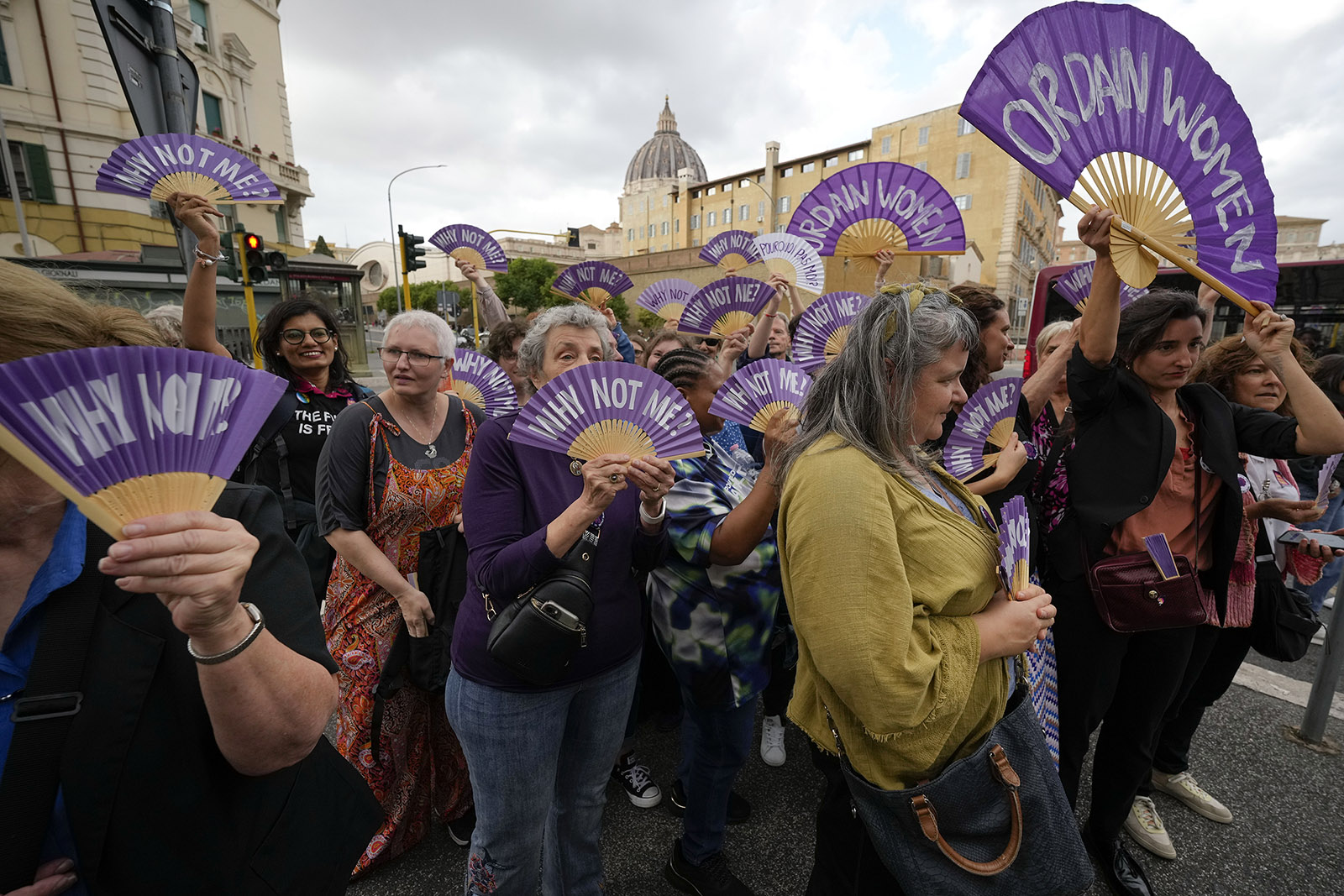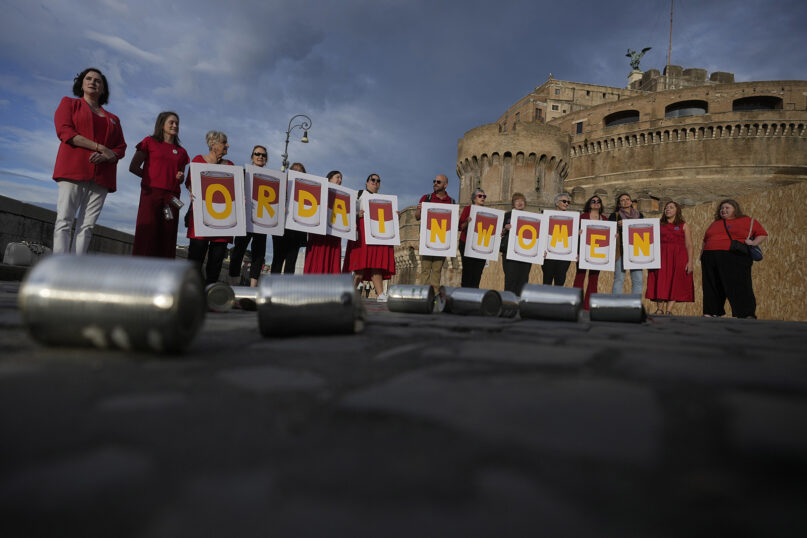
VATICAN CITY (RNS) — Almost 40 women from all over the world marched through the streets of Rome on Friday (Oct. 4) and, under the watchful gaze of police officers and the curious peeks of tourists, demanded the Catholic Church allow the ordination of women. Their protests were timed to the start of a monthlong Vatican summit on the pressing issues facing the church today.
A day earlier, the head of the Vatican’s doctrinal department, Cardinal Victor Manuel Fernandez, told a room full of bishops and Catholic representatives gathered for the summit that the female diaconate was off the table.
Deacons are allowed to preach during Mass, lead funeral processions and perform baptisms, but unlike priests, they can’t hear confessions or anoint the sick. Last year, Fernandez was tasked by the pope with overseeing a study group on the issue. Pope Francis, he said on Thursday, “does not consider the question mature” and his commission could not decide in favor on women deacons.
For the women who have been mobilizing and speaking in favor of women’s empowerment and the female diaconate, the cardinal’s comments were a hard blow. But despite the pope’s and the Vatican’s recalcitrance on this issue, they indicated they “are in it for the long run.”
“As we marched through the streets of Rome on Friday, there was a renewed sense of energy that this message needs to be heard now more than ever,” said Kate McElwee, executive director of Women’s Ordination Worldwide, who was among those leading the march.
For McElwee, Fernandez’s comments felt like “a betrayal” and pointed to the “lack of transparency” of the study group he oversees. When bishops and Catholics gathered in October of last year for a Vatican summit on synodality, which promised to usher in “a new way of being church” and focused on welcome and inclusion, women’s ordination as deacons was one of several hot-button issues discussed.

The prefect of the Vatican’s Dicastery for the Doctrine of the Faith, Cardinal Victor Manuel Fernandez, during a news conference at the Vatican, April 8, 2024. (AP Photo/Gregorio Borgia)
After last year’s summit, Pope Francis created 10 study groups of theologians, canon lawyers and experts to address the most controversial issues that emerged, including the female diaconate, which was handed over to the rather opaque doctrinal department at the Vatican. The groups were asked to present the work they had done so far to participants at this year’s summit and issue a final report in 2025.
Fernandez did not close the door completely to the female diaconate and encouraged more study of the issue, which has already been the subject of numerous studies and reports, including two commissions created by Pope Francis in 2016 and 2020. But many delegates at the Vatican summit reported being disappointed by the study group reports.
“I somehow felt like a watered poodle,” wrote Thomas Schwartz, a delegate at the summit, in his blog. Schwartz questioned the need for a study group if the decisions had already been made on women deacons. “At least I found it comforting that I was not alone in feeling this way,” he wrote, adding that other attendees shared their confusion during roundtable discussions and coffee breaks.
McElwee found it “very frustrating that we have to weed through Vatican-speak” to understand how church leadership will address the female diaconate in the future. While she hopes the summit will offer an opportunity for more people to be heard, she said she doesn’t expect great shifts in the structure of the institutional church as a result.
“But that doesn’t mean that people won’t continue to rattle those cages,” she said.

Advocates for women’s ordination hold signs reading “Ordain Women” during the “Don’t Kick the Can, Women Can Be Priests” flash mob rally in Rome, as Pope Francis opened the Synod of Bishops at the Vatican, Oct. 2, 2024. (AP Photo/Alessandra Tarantino)
Despite the church’s hesitation on the question of female deacons, women raising awareness on this issue said they are not willing to give up or leave the faith. For Ellie Hidalgo, co-director of Discerning Deacons, a network aimed at informing Catholics on campuses and in parishes about the female diaconate, Fernandez’s comments helped clarify the pope’s stance on this issue.
In May, the pope answered with a resounding “no” to the possibility of ordaining women deacons when asked by Norah O’Donnell of CBS for “60 Minutes.” But for Hidalgo, Fernandez’s statement shows that despite Francis’ hesitation, it’s not a closed question. The cardinal spoke of new ministries to be studied, including a ministry of listening and for preaching, which would allow laypeople to take on new roles. Hidalgo said she hopes the study group will issue guidance on how to pave the way toward women becoming deacons.
“We knew coming in that this question of women was not going to get resolved this month,” Hidalgo said. On Sept. 30, a representative of Discerning Deacons met with Pope Francis at the Vatican accompanied by two Canadian Indigenous women, a young adult minister and a nun assisting Indigenous communities in Australia. The group spoke to the pope about the work and ministry women are already doing in the church.
Francis “was supportive and encouraging of women being in ministry at the peripheries, and he understands just how important the work is, and the contribution that women make,” Hidalgo said, but he did not comment on the question of women deacons.
Hidalgo and her team believe in the pope’s project to bring the church together through synodality. “We’re in it for the long run,” she said, adding that she sees that change is already underway, with women participating and voting in the summit.
“I definitely see myself as somebody who is like planting seeds,” she said, adding that she is willing to continue watering those seeds even if they don’t bear fruit in her lifetime.
